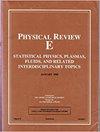Infection fronts in randomly varying transmission-rate media
IF 2.4
3区 物理与天体物理
Q1 Mathematics
引用次数: 0
Abstract
We numerically investigate the geometry and transport properties of infection fronts within the spatial SIR model in two dimensions. The model incorporates short-range correlated quenched random transmission rates. Our findings reveal that the critical average transmission rate for the steady-state propagation of the infection is overestimated by the naive mean-field homogenization. Furthermore, we observe that the velocity, profile, and harmfulness of the fronts, given a specific average transmission, are sensitive to the details of randomness. In particular, we find that the harmfulness of the front is larger the more uniform the transmission rate is, suggesting potential optimization in vaccination strategies under constraints like fixed average-transmission rates or limited vaccine resources. The large-scale geometry of the advancing fronts presents nevertheless robust universal features and, for a statistically isotropic and short-range correlated disorder, we get a roughness exponent and a dynamical exponent , which are roughly compatible with the one-dimensional Kardar-Parisi-Zhang (KPZ) universality class. We find that the KPZ term and the disorder-induced effective noise are present and have a kinematic origin.

随机变化传输速率介质中的感染前沿
我们在二维空间 SIR 模型中对感染前沿的几何形状和传输特性进行了数值研究。该模型包含短程相关淬火随机传播率。我们的研究结果表明,感染稳态传播的临界平均传播率被天真的平均场均质化所高估。此外,我们还发现,在特定的平均传播率下,前沿的速度、轮廓和有害程度对随机性的细节非常敏感。特别是,我们发现传播率越均匀,前沿的危害性就越大,这表明在固定的平均传播率或有限的疫苗资源等约束条件下,疫苗接种策略有可能得到优化。对于统计上各向同性和短程相关的无序状态,我们得到了粗糙度指数α≈0.42±0.10和动态指数z≈1.6±0.10,这与一维卡达尔-帕里什-张(KPZ)普遍性类基本一致。我们发现 KPZ 项和无序诱导的有效噪声是存在的,并且具有运动学起源。
本文章由计算机程序翻译,如有差异,请以英文原文为准。
求助全文
约1分钟内获得全文
求助全文
来源期刊

Physical review. E
物理-物理:流体与等离子体
CiteScore
4.60
自引率
16.70%
发文量
0
审稿时长
3.3 months
期刊介绍:
Physical Review E (PRE), broad and interdisciplinary in scope, focuses on collective phenomena of many-body systems, with statistical physics and nonlinear dynamics as the central themes of the journal. Physical Review E publishes recent developments in biological and soft matter physics including granular materials, colloids, complex fluids, liquid crystals, and polymers. The journal covers fluid dynamics and plasma physics and includes sections on computational and interdisciplinary physics, for example, complex networks.
 求助内容:
求助内容: 应助结果提醒方式:
应助结果提醒方式:


